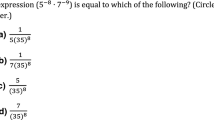Abstract
In a personalized learning context, teachers decide which content to assign to students on the basis of data. However, it is not clear that simply providing teachers with data is sufficient to promote good instructional decisions. In this paper, we study data from an online learning platform that gives teachers data on student test performance and then allows them to decide which new skill students should work on. We then apply a knowledge graph algorithm to infer whether the content the teacher assigned the student is a skill that the student is ready to learn (i.e. the skill is within the student’s Zone of Proximal Development), whether the student is not yet ready to learn the skill, or whether the student has already learned the skill. In this paper, we study how the teacher’s decision of what skills or topics the student should work on correlate to the student’s learning outcomes. We study this issue using logistic regression to compare whether students master more skills based on whether they are assigned ready-to-learn skills or unready-to-learn skills according to the knowledge graph. The results demonstrate that in both mathematics and English learning contexts, if the teacher selects skills which the student is assessed by the algorithm to be ready to learn, the student gains more mastery than if he or she is assigned skills he or she is not ready to learn. We conclude by proposing a visualization that more clearly surfaces the knowledge graph predictions to teachers.
Access this chapter
Tax calculation will be finalised at checkout
Purchases are for personal use only
Similar content being viewed by others
References
Baker, R., Wang, F., Ma, Z., Ma, W., Zheng, S.: Studying the effectiveness of an online language learning platform in China. J. Interact. Learn. Res. 29(1), 5–24 (2018)
Bienkowski, M., Feng, M., Means, B.: Enhancing teaching and learning through educational data mining and learning analytics: an issue brief, pp. 1–57. Office of Educational Technology, U.S. Department of Education, Washington, DC (2012)
Corbett, A.T., Anderson, J.R.: Knowledge tracing: modeling the acquisition of procedural knowledge. User Model. User-Adapt. Interact. 4(4), 253–278 (1995)
Earl, L., Katz, S.: Leading schools in a data-rich world. In: Leithwood, K., Hallinger, P. (eds.) Second International Handbook of Educational Leadership and Administration, pp. 1003–1022. Kluwer Academics, Dordrecht (2002)
Feng, M., Heffernan, N.T.: Informing teachers live about student learning: reporting in the assessment system. Technol. Instr. Cognit. Learn. 3(1/2), 63 (2006)
Gilbert, S.W.: A widening gap: the support service crisis. Syllabus 14(1), 18–57 (2000)
Holstein, K., McLaren, B.M., Aleven, V.: Intelligent tutors as teachers’ aides: exploring teacher needs for real-time analytics in blended classrooms. In: Proceedings of the Seventh International Learning Analytics & Knowledge Conference, pp. 257–266. ACM (2017)
Jonassen, D.H.: Thinking technology: context is everything. Educ. Technol. 31(6), 35–37 (1993)
Oliver, R., Omari, A.: Using online technologies to support problem-based learning: learners responses and perceptions. Aust. J. Educ. Technol. 15(1), 58–79 (1999)
Porayska-Pomsta, K.: AI as a methodology for supporting educational praxis and teacher metacognition. Int. J. Artif. Intell. Educ. 26(2), 679–700 (2016)
Mandinach, E.B., Jackson, S.S.: Transforming Teaching and Learning Through Data-Driven Decision Making. Corwin Press, Thousand Oaks (2012)
McLaren, B.M., Aleven, V.: Intelligent tutors as teachers’ aides: exploring teacher needs for real-time analytics in blended classrooms. In: Proceedings of the Seventh International Learning Analytics & Knowledge Conference, pp. 257–266. ACM (2017)
Murray, T., Arroyo, I.: Toward measuring and maintaining the zone of proximal development in adaptive instructional systems. In: Cerri, S.A., Gouardères, G., Paraguaçu, F. (eds.) ITS 2002. LNCS, vol. 2363, pp. 749–758. Springer, Heidelberg (2002). https://doi.org/10.1007/3-540-47987-2_75
Vygotsky, L.S.: Mind in Society: The Development of Higher Psychological Processes. Harvard University Press, Cambridge (1978)
Author information
Authors and Affiliations
Corresponding authors
Editor information
Editors and Affiliations
Rights and permissions
Copyright information
© 2019 Springer Nature Switzerland AG
About this paper
Cite this paper
Zou, X., Ma, W., Ma, Z., Baker, R.S. (2019). Towards Helping Teachers Select Optimal Content for Students. In: Isotani, S., Millán, E., Ogan, A., Hastings, P., McLaren, B., Luckin, R. (eds) Artificial Intelligence in Education. AIED 2019. Lecture Notes in Computer Science(), vol 11626. Springer, Cham. https://doi.org/10.1007/978-3-030-23207-8_76
Download citation
DOI: https://doi.org/10.1007/978-3-030-23207-8_76
Published:
Publisher Name: Springer, Cham
Print ISBN: 978-3-030-23206-1
Online ISBN: 978-3-030-23207-8
eBook Packages: Computer ScienceComputer Science (R0)




